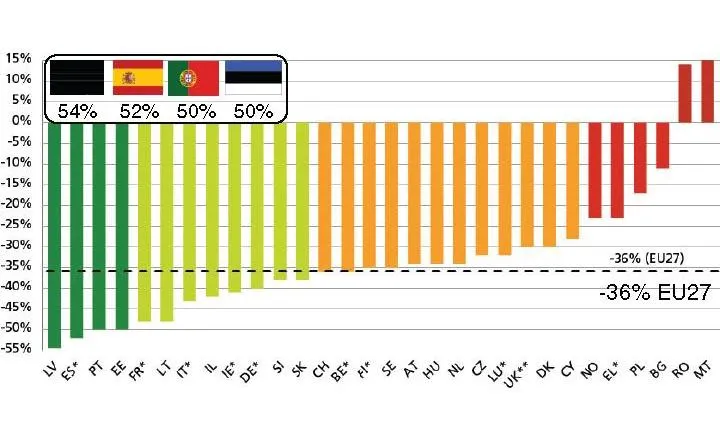The latest data from the European Commission reveals that road fatalities across the EU decreased by 9% in 2012. This shows that 2012 saw the lowest numbers of people being killed in road traffic crashes in EU countries since data first began being collated. Vice-president Siim Kallas, Commissioner for Transport, said, "2012 was a landmark year for European road safety, with the lowest ever number of road deaths recorded. A 9% decrease means that 3,000 lives were saved last year. It is hugely encouraging to
March 26, 2013
Read time: 2 mins
The latest data from the 2465 European Commission reveals that road fatalities across the EU decreased by 9% in 2012. This shows that 2012 saw the lowest numbers of people being killed in road traffic crashes in EU countries since data first began being collated. Vice-president Siim Kallas, Commissioner for Transport, said, "2012 was a landmark year for European road safety, with the lowest ever number of road deaths recorded. A 9% decrease means that 3,000 lives were saved last year. It is hugely encouraging to see these kinds of results. Still 75 people die on Europe's roads every day, so there is no room for complacency. We have ambitious goals to cut EU road deaths in half by 2020 and we need to keep up this momentum to get there.
"Road deaths are only the tip of the iceberg. For every death on Europe's roads there are 10 serious injuries such as damage to the brain or spinal cord. We need a strategy to bring down the number of serious road injuries everywhere in the EU."
Country by country statistics show that the number of road deaths still varies greatly across the EU hoever. The countries with the lowest number of road fatalities remain the UK, Sweden, the Netherlands and Denmark, reporting around 30 deaths/million inhabitants.
Compared to the disappointing figures of 2011, when progress in cutting road deaths fell to 2%, the reduction of 9% in 2012 mean that Member States are back on track towards the objective of halving road deaths between 2010 and 2020. In order to reach this goal, an average reduction of around 7% is needed.
But the most worrying feature of the road safety statistics for 2011 was a high increase in the number of killed vulnerable users such as pedestrians, motorcyclists and elderly people, in spite of an overall reduction of road fatalities. Based on the provisional data for 2012, the number of vulnerable user fatalities has decreased substantially in 2012.
"Road deaths are only the tip of the iceberg. For every death on Europe's roads there are 10 serious injuries such as damage to the brain or spinal cord. We need a strategy to bring down the number of serious road injuries everywhere in the EU."
Country by country statistics show that the number of road deaths still varies greatly across the EU hoever. The countries with the lowest number of road fatalities remain the UK, Sweden, the Netherlands and Denmark, reporting around 30 deaths/million inhabitants.
Compared to the disappointing figures of 2011, when progress in cutting road deaths fell to 2%, the reduction of 9% in 2012 mean that Member States are back on track towards the objective of halving road deaths between 2010 and 2020. In order to reach this goal, an average reduction of around 7% is needed.
But the most worrying feature of the road safety statistics for 2011 was a high increase in the number of killed vulnerable users such as pedestrians, motorcyclists and elderly people, in spite of an overall reduction of road fatalities. Based on the provisional data for 2012, the number of vulnerable user fatalities has decreased substantially in 2012.








